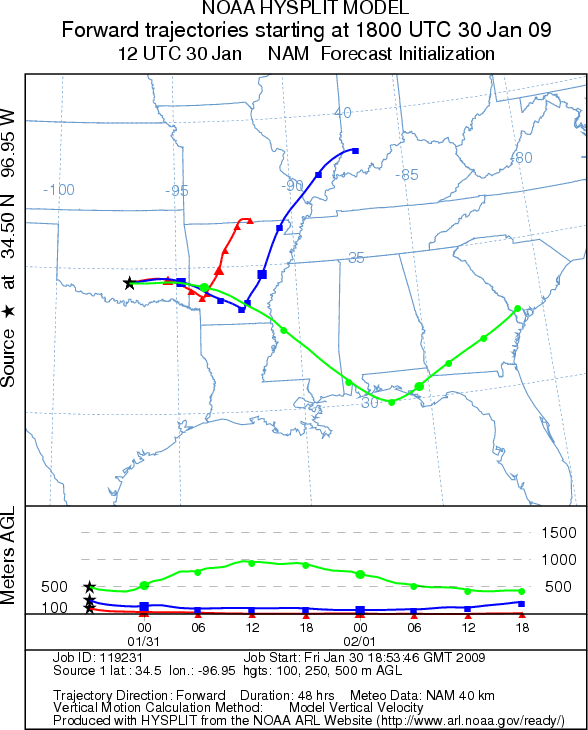The University of Tulsa
Mountain Cedar Pollen Forecast
Metropolitan Area |
Exposure Risk |
|
Oklahoma City |
Low |
|
Tulsa |
Low |
|
St. Louis MO |
Low |
Date Issued: 30 January 2009
Mountain Cedar Location(s): Arbuckle Mountains, OK
Regional Weather: Friday, January 30 – TX/OK:
Across the region the weather will continue warming today and tomorrow. Skies will be sunny across the region
today and clear to mostly clear tonight. In Oklahoma sunny skies will bring temperatures into the mid to upper
50s with west winds starting light but building towards the afternoon and early evening. Overnight low temperatures
will be in the low 30s as winds become light and variable. Tomorrow conditions will continue warm as high temperatures
are expected in the upper 60s. Winds will pivot from a westerly direction to southerly becoming moderate to strong.
In Texas, sunny skies will prevail today and tomorrow. High temperatures today are expected to be in the low
to mid 60s today and the upper 60s to low 70s tomorrow. Winds will be from the west, southwest today across the
Edwards Plateau starting as light but building towards the afternoon gaining in strength and shifting to southerly
winds tomorrow.
Trajectory weather: Air mass trajectories from the Arbuckle Mountains move to the east this afternoon into
Arkansas and then shift to the northeast tomorrow. The atmosphere will remain dense today with the air mass moving
near or at ground level. At the source area, mostly sunny skies will occur today with temperatures in the upper
50s. Overnight lows will be in the lower 30s with warming into the 60s tomorrow. Winds will be moderate this morning
from the west, then pick up to moderately strong conditions afternoon. Tomorrow winds will switch coming from a
southerly direction gaining in strength.
OUTLOOK: *** Moderate Threat *** good conditions for pollen release today but poor
conditions for entrainment and transport. Warming conditions with light and variable to moderate winds but
with a dense atmosphere will present a mix of good conditions for pollen release, yet poor conditions for entrainment
and travel. Late afternoon building wind strength may overcome the denser atmospheric conditions to transport
pollen downwind. Late January is usually the time that pollination in Juniperus ashei trees begins to wane, thus
lower concentrations in the atmosphere, even under excellent conditions for dispersal. This period also signals
the beginning of pollination of Juniperus virginiana a species that is somewhat less allergenic. In many cases
the concentration of pollen in the atmosphere will remain significant but result in fewer symptoms as it represents
a mix of the two species.
Trajectory weather:
OUTLOOK: *** Moderate Threat *** favorable
Trajectory Start (s) (shown by black
star on map): Sulfur, OK.

Prepared by: Estelle
Levetin
(Faculty
of Biological Science, The University of Tulsa, 800 S. Tucker Dr., Tulsa, OK 74104) and Peter
K Van de Water
(Department of Earth and Environmental Science, California State University Fresno, 2576 East San Ramon Avenue,
M/S ST24, Fresno CA 93740-8039). This forecast gives the anticipated future track of released Mountain Cedar pollen,
weather conditions over the region and along the forecast pathway, and an estimated time of arrival for various
metropolitan areas.
Questions: Aerobiology Lab e-mail: pollen@utulsa.edu
Return to Forecasting Home Page